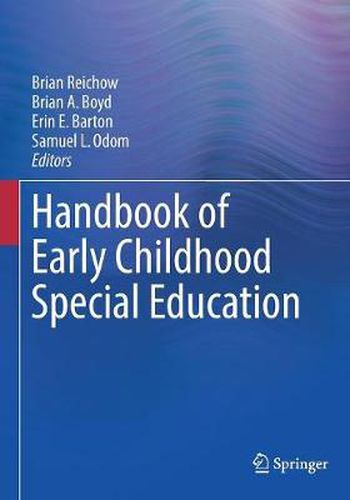Readings Newsletter
Become a Readings Member to make your shopping experience even easier.
Sign in or sign up for free!
You’re not far away from qualifying for FREE standard shipping within Australia
You’ve qualified for FREE standard shipping within Australia
The cart is loading…






This title is printed to order. This book may have been self-published. If so, we cannot guarantee the quality of the content. In the main most books will have gone through the editing process however some may not. We therefore suggest that you be aware of this before ordering this book. If in doubt check either the author or publisher’s details as we are unable to accept any returns unless they are faulty. Please contact us if you have any questions.
This handbook discusses early childhood special education (ECSE), with particular focus on evidence-based practices. Coverage spans core intervention areas in ECSE, such as literacy, motor skills, and social development as well as diverse contexts for services, including speech-language pathology, physical therapy, and pediatrics. Contributors offer strategies for planning, implementing, modifying, and adapting interventions to help young learners extend their benefits into the higher grades. Concluding chapters emphasize the importance of research in driving evidence-based practices (EBP).
Topics featured in the Handbook include:
Family-centered practices in early childhood
intervention. The application of Response to Intervention (RtI) in
young children with identified disabilities.
Motor skills acquisition for young children with
disabilities. Implementing evidence-based practices in
ECSE classrooms.
* Cultural, ethnic, and linguistic implications for ECSE.
The Handbook of Early Childhood Special Education is a must-have resource for researchers, professors, upper-level undergraduate and graduate students, clinicians, and practitioners across such disciplines as child and school psychology, early childhood education, clinical social work, speech and physical therapy, developmental psychology, behavior therapy, and public health.
$9.00 standard shipping within Australia
FREE standard shipping within Australia for orders over $100.00
Express & International shipping calculated at checkout
This title is printed to order. This book may have been self-published. If so, we cannot guarantee the quality of the content. In the main most books will have gone through the editing process however some may not. We therefore suggest that you be aware of this before ordering this book. If in doubt check either the author or publisher’s details as we are unable to accept any returns unless they are faulty. Please contact us if you have any questions.
This handbook discusses early childhood special education (ECSE), with particular focus on evidence-based practices. Coverage spans core intervention areas in ECSE, such as literacy, motor skills, and social development as well as diverse contexts for services, including speech-language pathology, physical therapy, and pediatrics. Contributors offer strategies for planning, implementing, modifying, and adapting interventions to help young learners extend their benefits into the higher grades. Concluding chapters emphasize the importance of research in driving evidence-based practices (EBP).
Topics featured in the Handbook include:
Family-centered practices in early childhood
intervention. The application of Response to Intervention (RtI) in
young children with identified disabilities.
Motor skills acquisition for young children with
disabilities. Implementing evidence-based practices in
ECSE classrooms.
* Cultural, ethnic, and linguistic implications for ECSE.
The Handbook of Early Childhood Special Education is a must-have resource for researchers, professors, upper-level undergraduate and graduate students, clinicians, and practitioners across such disciplines as child and school psychology, early childhood education, clinical social work, speech and physical therapy, developmental psychology, behavior therapy, and public health.